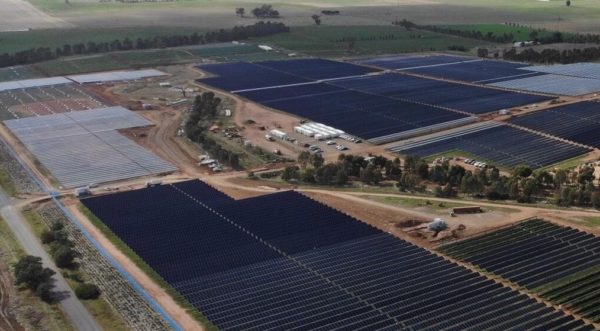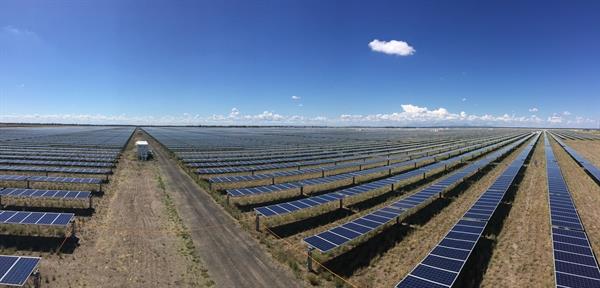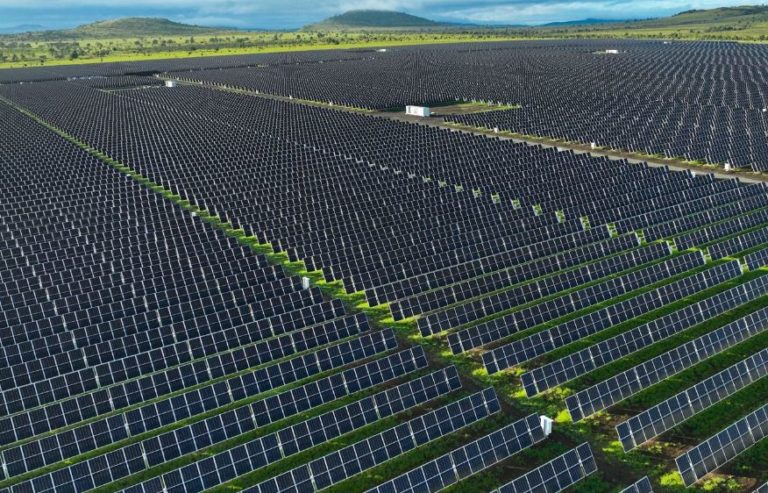A 110 MWp solar farm that is fully constructed and currently undergoing hold-point testing is one of a trio of PV assets that Greece-based industrial conglomerate Mytilineos has secured finance for as it looks to further establish its position in the Australian renewable energy market.
Mytilineos has now reached financial close on three Australian PV projects, two in Queensland and one in New South Wales (NSW), with a combined generation capacity of 238 MWp as it continues to develop its solar pipeline in the country.
The portfolio includes the 110 MWp Moura Solar Farm being developed near the town of the same name in central Queensland. Mytilineos said construction of the solar farm has already been completed and the asset is now undergoing hold-point testing and expected to begin generating power in 2023.
Also included in the portfolio is the 53 MWp Kingaroy Solar Farm, also in Queensland, and the 75 MWp Wyalong plant being developed in the NSW Riverina region. The company said construction of the Wyalong Solar Farm is “substantially progressed” with the project expected to be completed in the first half of this year. Early works have begun on the Kingaroy project, with main works expected to be carried out during 2023.
The financing package, from backers ANZ and Westpac, is structured as a combination of term facility, construction facility and ancillary facilities totaling AUD 234 million ($156 million).
Mytilineos Renewables Executive Director Nikos Papapetrou said the new funding will enable additional projects to be financed and constructed in 2023 and beyond, further consolidating the company’s position in the wider Australian and Pacific market.
“Australia is a key market for Mytilineos’ global renewables development strategy, extending across the Asia-Pacific, Europe, and Latin America regions,” he said. “We are pleased with the trust given to the company and to our vision in the region and we look forward to many more successful financings for our future projects”.
According to the company, its Australian portfolio totals 400 MW and is part of a worldwide pipeline of solar and energy storage projects under various stages of development that exceeds 4 GW.

Once completed, the Moura, Kingaroy and Wyalong solar farms are expected to produce about 500 GWh of renewable energy annually.
Mytilineos said the majority of that power has already been sold in a series of long-term power purchase agreements (PPAs). More than half of the output of the Moura Solar Farm has been allocated through a long-term PPA with Queensland government-owned generator CS Energy while Smartest Energy, an electricity retailer owned by Japanese investment company Marubeni, has an offtake agreement in place for power produced at the Kingaroy installation. Publicly owned telecommunications company NBN Co has inked a deal to acquire about half of the output from the Wyalong Solar Farm.
This is Mytilineos’ second project financing in Australia, having reached financial close on three 40 MWp solar farms in NSW in late 2021.
ANZ Corporate Finance Executive Director Mark Clover said Mytilineos’ expansion in Australia is “encouraging” for the renewable energy market and aligns with the bank’s goal of funding and facilitating $100 billion in sustainable solutions by 2030.
ACEN corporation
Philippines-based energy company ACEN Corporation also plans to capitalize on Australia’s “unparalleled renewables potential” after securing a $191 million loan facility which it says will be accelerate the delivery of an 8 GW clean energy portfolio that includes solar, wind, battery storage and pumped hydro. The loan will form part of the $414 million ACEN hopes to raise in order to grow its renewables capacity in Australia and the broader Asia-Pacific region to 20 GW by 2030.
ACEN, which claims to already have approximately 4 GW of attributable capacity across the Philippines, Vietnam, Indonesia, India and Australia, said it has more than 1.5 GW of projects across the Australian states of NSW, Tasmania, Victoria and South Australia “under construction or at an advanced stage of development” and the new loan will allow it to advance those projects.
“The funds will be allocated to finance the development and construction of ACEN's project pipeline in Australia encompassing solar, wind, battery storage, pumped hydro power and energy storage,” the company said in a statement.
The first of these projects, the New England Solar Farm, is expected to be in operation by the middle of 2023 after the project was granted formal registration to send power to the National Electricity Market (NEM).
ACEN said energy production from the 400 MW first stage of the New England Solar Farm is now underway after the project generated and delivered 5 MW of clean renewable energy into the NEM.

Construction of the first stage of the solar farm and 50 MW/50 MWh battery energy storage system commenced in early 2022. The estimated $530 million project will eventually see a 720 MW solar farm co-located with battery energy storage. There is potential for the energy storage system to be scaled up to 200 MW/400 MWh.
The company has also commenced construction of the 400 MW Stubbo Solar Farm and associated 200 MW/200 MWh battery energy storage project being developed near Dubbo in the NSW central west. ACEN Australia this week awarded the engineering, procurement and construction (EPC) contract to PCL Construction with notice to proceed already having been issued.
ACEN Australia Construction Manager Tim Greenaway said all major contracts are now in place, including the connection agreement with infrastructure service provider Lumea and the execution of PV module supply contracts.
“It is exciting to finalise the EPC with PCL Construction for the development of the Stubbo Solar project,” he said. “We look forward to working with them over the next several years to deliver the project and help support the transition to a low emission generation supply in NSW.”
Other projects in the company’s Australian portfolio include the proposed 600 MW Birriwa solar farm and battery project also in NSW, a share in the 250 MW Baroota pumped hydro and 300 MW Bridle Track solar projects in South Australia, and the 160 MW Axedale Solar Farm in Victoria, which may also come to include a battery energy storage system. ACEN is also pursuing wind projects in NSW and Tasmania.
The new loan facility is backed by the Bank of China (BOC) in Manila and Hong Kong, CTBC Bank in Manila and Singapore, and Standard Chartered Bank in Australia. ACEN said Bank of China was the green loan structuring bank, while Commonwealth Bank of Australia served as the agent for the loan facility.
ACEN Australia Chief Executive Officer Anton Rohner said the loan facility is a follow on from several transactions completed last year.
“This syndicated green term loan facility continues to build on the funding secured at the end of last year, and will be mobilised into our Australian portfolio,” he said. ‘With Stubbo 520 MWdc project reaching notice to proceed late in 2022, ACEN continues on the journey in decarbonising Australia. It is exciting to work with quality financial institutions, and the appetite for quality investments is real.”
In August 2022, ACEN Australia executed a $100 million loan facility with DBS Bank Australia. The following month, ACEN executed an agreement with the Sydney branch of global financial group MUFG for an up to $140 million loan facility and secured a $52 million green debt facility with the Australian government-owned Clean Energy Finance Corporation (CEFC).
This content is protected by copyright and may not be reused. If you want to cooperate with us and would like to reuse some of our content, please contact: editors@pv-magazine.com.




2 comments
By submitting this form you agree to pv magazine using your data for the purposes of publishing your comment.
Your personal data will only be disclosed or otherwise transmitted to third parties for the purposes of spam filtering or if this is necessary for technical maintenance of the website. Any other transfer to third parties will not take place unless this is justified on the basis of applicable data protection regulations or if pv magazine is legally obliged to do so.
You may revoke this consent at any time with effect for the future, in which case your personal data will be deleted immediately. Otherwise, your data will be deleted if pv magazine has processed your request or the purpose of data storage is fulfilled.
Further information on data privacy can be found in our Data Protection Policy.